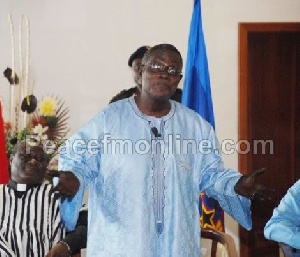SHOULD we or should we not be told about the state of the president’s health? In Ghana we have always gone for the extreme privacy option. Our leaders are never ill and indeed they do not even get tired.
And they certainly do not die.
The chief or king in the traditional set-up only ever “goes to his village” –– it is treasonable to say he has died.
We all watched painfully the theatre of the absurd played out in Nigeria when President Umaru Yar’Adua was ill. To the bitter end, it was never acknowledged that he was ill.
Cast your mind back to 1982, President Ahmadou Ahidjo of Cameroon was persuaded by a team of doctors in France, at least that was the informed gossip, that his health was so bad he was not likely to make it to the end of the year. Ahidjo stepped down and handed over power to his prime minister and preferred successor, Paul Biya.
Two years later, Ahidjo found himself still alive, indeed, in good health and being ignored by Biya.
He then tried to stage a coup d’etat; it failed and he ended up in lonely exile in Senegal where he died almost 20 years later.
The lesson was not lost on leaders around the continent.
Then there was the unmatchable first president of Tunisia, Habib Bourguiba. As his health failed, Tunisian officials found ever more ingenious ways of describing the president’s incapacity: He had “a chill”, “an indisposition”, “exhaustion”, “a minor illness”, “a respiratory ailment” and “a slight deterioration in his health”.
While officially suffering from insomnia, Bourguiba often medicated himself and was a veritable walking drugstore between self-administered drugs and the medications his various physicians were prescribing.
Finally, Prime Minister Zine El Abidine Ben Ali galvanised the inner circle of officials who called a panel of physicians to certify Bourguiba’s permanent inability, in what has been called a constitutionally sanctioned, medically facilitated coup d’etat.
Ben Ali became president.
That was in 1987, Ben Ali is still president –– Bourguiba lingered on and only died in the year 2000.
For a man who was not expected to make it to the end of 2008, to even get elected or so we were told by people in the know, the Ghanaian President John Atta Mills has survived with amazing agility. And yet the rumours persist.
The latest stories were sparked by the fact that the president’s palms have turned alarmingly black.
After weeks of speculation in the media, one of the president’s spokespersons has offered an explanation.
The president, we are told, is well, his darkened palms are a reaction to some medication given to him by his doctors.
We have not been told what the medication was or what condition the president had to necessitate taking the drugs in the first place.
But the spokesperson assured us the president is very strong and stable, and has been given a clean bill of health by all the doctors.
He said the president still gets up at 4.30am every day and does his exercises, and is still the same sports person he has always been.
Somehow the image of our president getting up at 4.30am every morning as though he has a wicked stepmother who is whipping him out of bed to do the chores, is hard to take.
Elizabeth Ohene was a minister in Ghana’s former NPP government.

















